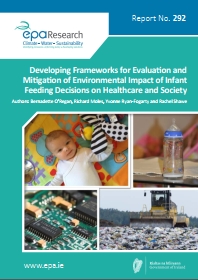Research 292: Developing Frameworks for Evaluation and Mitigation of Environmental Impact of Infant Feeding Decisions on Healthcare and Society
Authors: Bernadette O’Regan, Richard Moles, Yvonne Ryan-Fogarty and Rachel Shawe
Summary: Substantial environmental costs result from infant feeding decisions, not only regarding milks, foods and equipment purchased, but also regarding disposal of plastics, packaging and food waste. Existing infant feeding policies and waste management guidance do not address the disposal and waste aspects.

Identifying Pressures
Healthcare institutions, in an important way, are especially complex settings for taking action to reduce waste. Healthcare employees have many responsibilities; core to this are the health and welfare of patients. This research conducted a study of two Irish maternity units to estimate the range and amount of waste products produced. Parents decided on the initial diet for their new-born infants: breast milk alone, bottled breast milk substitute alone or a combination of both. Bottled milk created waste in maternity units, for example through the disposal of packaging (predominantly plastic) and unused milk (with a high biological oxygen demand). Breast milk created waste streams, for example waste electrical and electronic equipment (WEEE) through the disposal of breast pumps and energy used in the refrigeration of stored milk. A Review Tool, in the form of a set of questions, was developed in order to facilitate the speedy collection of key data in maternity units and identify key personnel who could supply the answers to the Review Tool questions.
Informing Policy
The medical implications of parental decisions regarding the feeding of infants fall outside the scope of this study. The aims of the National Waste Prevention Programme: Towards a Resource Efficient Ireland. A National Strategy to 2020 are supported in this study through evaluation and mitigation of wasteful consumption. The National Hazardous Waste Management Plan 2014–2020 is supported through the identification of a previously unreported source of WEEE. Waste management best practice, as set out in A Resource Opportunity: Waste Management Policy in Ireland, is supported through identifying feasible resource efficiency measures. Food procurement is one of eight priorities identified within Green Tenders: An Action Plan on Green Procurement. This report identifies actions that are designed to mitigate impacts associated with the procurement of ready-to-use breast milk substitutes. The report explores ways of mainstreaming mitigation measures identified in maternity ward case studies, thus supporting a wider agenda for sustainable development, as set out in Our Sustainable Future: A Framework for Sustainable Development in Ireland. The study exemplifies the need for, and constraints on, close ties between environmental protection and healthcare provision.
Developing Solutions
Five recommendations within the report identify key issues and, for each, solutions are identified and explained. It was noted that data on waste arising in maternity units were not recorded systematically. Measuring future progress will require better record keeping. The findings suggest that awareness across healthcare personnel and parents about the environmental impacts of infant feeding decisions was often poor. Renewed awareness-raising campaigns are suggested. Procurement policy must reflect the need to maintain the highest standards in healthcare, allied to waste reduction as a priority. Actions to reduce the disposal of unwanted milk to mains drainage are explored. This study found that efficient recycling of plastic bottles that are often used for ready-to-use breast milk substitutes is made difficult as the packaging contains a variety of materials, some of which do not allow identification of the polymer type. The recommendations will have more general relevance for reducing plastic waste. From an environmental perspective, increasing numbers of parents opting for breastfeeding will result in a reduction in the use of plastic bottles, and all reductions in WEEE are to be welcomed. Confining actions to individual maternity units only is unlikely to be fully effective in minimising wastes. This report presents a case study in the adoption of a whole-hospital approach to waste management.
https://www.epa.ie/media/archive/research/research-thumbnails/Research_292_Thumbnail.jpg